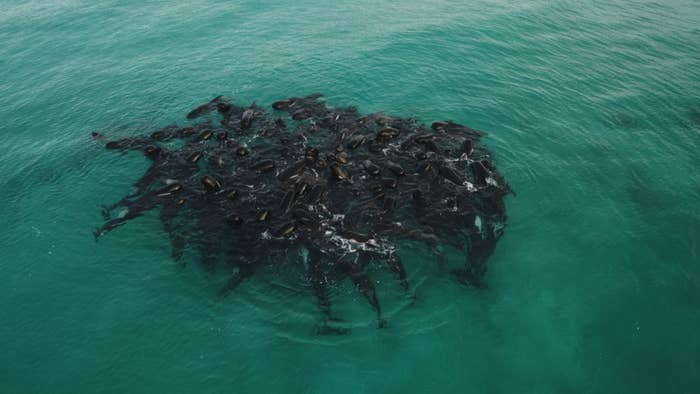View this video on YouTube
Nearly 100 whales beached themselves in Western Australia this week, spurring a massive rescue effort involving multiple experts and volunteers.
In an initial statement shared on Tuesday, the Parks and Wildlife Service of Western Australia said it had received reports of “a pod of long-finned pilot whales” that had grouped near Cheynes Beach.
“We ask the public to keep their distance and refrain from approaching the pod via drones or vessels,” officials said at the time.
Subsequent updates revealed more details, including the tragic deaths of 51 whales following a “mass stranding” overnight on Tuesday. In response, Parks and Wildlife Service officials and others involved in the response effort worked tirelessly to try to save the remaining whales.

Footage showed officials working to lead 45 surviving whales into deeper water for their survival. While staff members and volunteers were successful in keeping the whales alive for another day, a subsequent re-stranding ultimately resulted in a decision being made to euthanize the animals “to avoid prolonging their suffering.”
In what stands as the most recent update on the incident at the time of this writing, officials offered their “heartfelt thanks” to all involved with the massive rescue operation.
“Despite the best efforts of volunteers and staff at Cheynes Beach to move the 45 whales to deeper water, at approximately 5pm on Wednesday all of the whales re-stranded just meters further along the beach,” the department said on Wednesday. “Within an hour of beaching, veterinarians had assessed the whales and confirmed they were displaying signs of rapid deterioration. Two whales died of natural causes. Our incident management team then determined the most appropriate and humane course of action was to euthanize the 43 remaining whales to avoid prolonging their suffering.”
Complex has reached out to Parks and Wildlife Service for comment. This story may be updated.
When reflecting on the questions that remain regarding the stranding, marine biologist Kate Sprogis pointed to pilot whales’ elephant-like approach to family. Per Sprogis, as seen in her recent piece for The Conversation, mass stranding like this one “may occur” when the matriarch becomes ill. “External stress” may also cause strandings.

